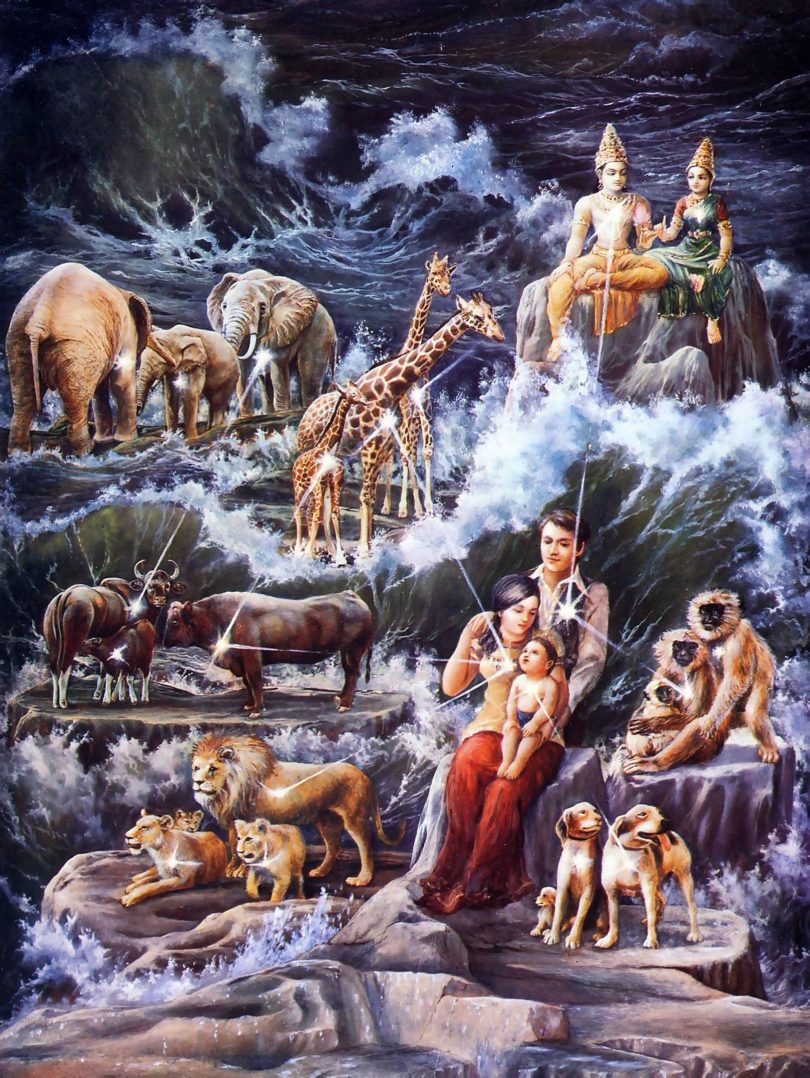Question: 1. First of all, thank you for your sanga and your potent enlightening answers. We have heard that the human form is the most valuable one and that only out of human form can the living beings go back home, back to Krishna. Does this refer also to the great sages and demigods? Do they also fall down on the earth in drops of rain, attain human bodies and out of them go back home when they also finish the process of bhakti yoga?
Is it only through the human form that the living entities can go back home also out of the bodies of animals (from Vrndavan) or if they attain the association of pure Vaisnavas (like a dog in lord Caitanyas lila). We thank you very much in advance for your answer and pray that you are well.
Answer by Romapada Swami:
Thank you very much for your kind words and your well-wishing prayers!
There is no rule that souls embodied in other forms of life cannot go back to Godhead, but it doesn’t happen that way generally because of the strongly pervasive mood of enjoyment of the superior pleasures of heaven that most of its inhabitants are preoccupied with, or in activities of ignorance, in the case of lower life forms like animals. It is the human form of life that provides the greatest impetus and facility for spiritual pursuit; other forms of life are designed for other purposes.
There are examples of great sages ascending through all the higher planets up to Brahma-loka and being completely purified, they along with Brahma, directly return back to Godhead from Satyaloka, at the time of universal annihilation. Again, in some instances greatly advanced souls may take one last birth in a lower body due to some residual sinful reactions or offenses, before they return back to Godhead, as said about the animals in Vrndavan, or as we see in the history of Gajendra. Instances such as Sivananda’s dog being delivered and Gajendra’s being liberated are rare. Regardless of the external situation, however, as soon as one revives their original spiritual consciousness, they are immediately in the kingdom of God.
Question: 2. We hear cases of dogs or fish taking four-handed forms and going to the spiritual world when devotees gave them some prasadam. Then why is it that the human form of life is considered more valuable? Devotees could bless everyone to become fish and give them prasadam.
Answer by Romapada Swami:
Certainly one pure devotee is capable of delivering all living entities; yet although they are freely distributing their mercy, only the qualified recipients derive the full benefit. Prabhupada explains that while the sun is distributing its rays everywhere, the blind man is unable to receive those rays.
This qualification for receiving descending mercy is not to be calculated in material terms, but based on our faith and great eagerness to achieve that mercy. All of our sincere devotional efforts, sadhana, and execution of duties is simply to attract that mercy, or more precisely to make ourselves eligible to receive that mercy. Work AND grace – both are necessary.
One references which you perhaps have previously heard relates an incident wherein some fish that had eaten the remnants of Ramanujacarya attained four-handed forms and ascended to the sky. It is said that his disciples then inquired of him how the fish could have attained such a destiny, while they themselves having honored his remnants many times have not yet attained such perfection. Ramanujacarya replied that because the disciples did not yet have complete faith, they committed offenses by discriminating and making material judgements about prasadam, and thus could not experience the potency of the prasadam, while the fish were not guilty of any such offense. This is not to say that animals, being ignorant, have a better chance than human beings. Rather such pastimes go to illustrate the efficacy of transcendental association in a simple heart, while those lacking such simplicity and faith, even though more qualified by our human estimation in austerity, knowledge, piety etc are bereft of such grace if they failed to guard themselves from offenses.
Sometimes an honorary doctorate may be awarded to an illiterate person for their exceptional qualifications, but this doesn’t minimize the need for other students to apply themselves ever-so-diligently to their studies.







